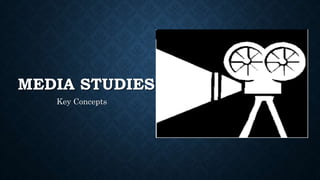
Media Studies
- 2. KEY CONCEPTS Media studies is based on seven basic concepts. As I believe these concepts can be taken as the building blocks of media. They are: Media Ideology Genre Representative Audience Institution Narrative The most widely used acronym for which is ‘MIGRAIN’.
- 3. MEDIA FORMS & LANGUAGE Media forms and language basically refers to the form of communication humans express themselves in. It also refers to the exact kind of display that is to be chosen to communicate. There are many different types of platforms that can be used, for example, film, radio, music, magazines, newspaper (newspaper was the first ever media text) etc.. Each type has its own style which has to be carefully analysed ad applied.
- 4. IDEOLOGY An ideology is a set of opinions or beliefs of an individual or a group. Media has a crucial role in shaping the cultural sphere of a society. Its role is based on the information that it provides which stimulates political ideas, social actions, public policies and priorities. This information produces values in cultural spheres that drives the world today.
- 5. GENRE The word “genre” comes from the French word meaning ‘type’ or ‘class’. A genre can be recognized by its common set of distinguished features. These features associated with a genres style and content may be, for example, a particular setting, character type, technical codes (lighting or music). Audiences recognize these features and therefore expect certain things. For example, at the end of a romantic comedy film, the audience expects the two lead characters to fall in love.
- 6. REPRESENTATION Representation is the way in which media portrays particular groups, communities, experiences, ideas or topics from a particular ideological or value perspective. For example, in western movies Indians are mostly shown in ‘sari’s’ , while Muslim men are always shown with a long beard. Disney corporation represents stories and fairy- tales for children primarily in terms of White Western middle class-values.
- 7. AUDIENCE This is a very important factor throughout media. All media texts are made with an audience in mind i.e., a group of people who will receive it and make some sort of sense out of it.
- 8. INSTITUTION It is basically a company or organization that is accountable for media texts. Usually it is a company that owns numerous companies involved in mass media enterprises such as television, radio, publishing, motion pictures etc.. Some of the institutions in media are Warner brothers and Pixar, both of which works towards making films.
- 9. NARRATIVE It is the media term for story-telling. It is the way different elements in a story are organized to make a meaningful story. These elements can be facts in a documentary or characters or actions as in a drama. All media texts have a narrative, whether they are a six hour T.V miniseries or a single-paragraph newspaper story or a glossy magazine photograph.